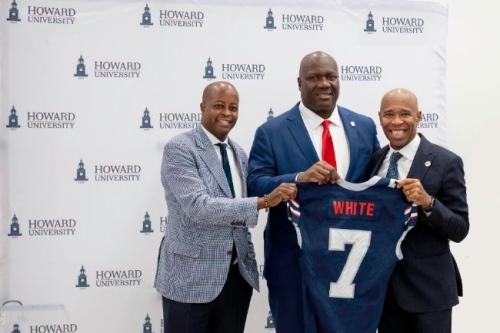Image above: The women bicycle around the Howard University campus during physical education class in 1949. Photo Credit: Howard University Archives
When Joseph Hunter Brooks and Frederick Dewitt Malone craftily wove the words “there she stands for truth and right, sending forth her rays of light.” into lyrics of Howard University’s alma mater in 1919, it was undoubtedly an ode to the institution — Howard was and remains a beacon of hope, even during some of the seemingly most hopeless times, the birthplace of some of the world’s most impactful revolutions, and “home” to some of the world’s most influential social justice advocates — and perhaps a subliminal nod to the Howard Woman.
The Howard Woman is not a monolith, and no singular definition can accurately encompass all that the she means to society. No matter their role — student, faculty, staff, or alumni — one thing remains true: The Howard woman shatters glass ceilings, paving a better, more just path for the next generation.
Unlike many institutions of its day, Howard was founded with a rejection of discriminatory practice in the areas of race, class, religion, or gender, marking its singularity as an institution that sought to both provide a solution for the global plague of racial and gender-based inequity and create a model as an academic institution that forwarded inclusive thought.
In 1870, Howard’s first graduating class (of the Normal Department) was comprised of all women, some of whom were the first students to be enrolled, including the daughters of the university’s white founders and first trustees. In 1884, Mary Ann Shadd Carey made history at the Howard University School of Law when she became the first Black woman to enroll. Today, more than 70% of Howard’s student body population is made up of women, more than half of the institution’s executive leadership is made up of women, and more than half of the academic deans are Black women. It is a testament to the value Howard places on the contributions of Black women, who are often experts in their respective fields and have an outsized leadership impact.
As Women’s History Month 2025 comes to a close, here is a look at six of the many, many Howard women who have helped define the university and the nation.
Pioneers of the Past
Lucy Diggs Slowe (B.A. 1908), Howard University’s first dean of women, founder of Alpha Kappa Alpha Sorority Inc., and award-winning athlete
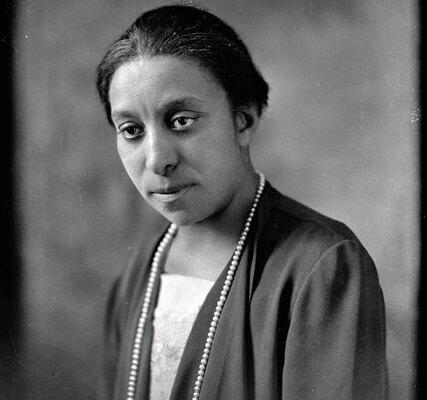
Among the legions of legendary Howard alumna is Lucy Diggs Slowe, a champion in every right. Slowe lost both of her parents by the age of six, but persevered. An exemplary student, she graduated from Howard as her class valedictorian after founding Alpha Kappa Alpha Sorority Inc., the nation’s oldest Greek letter sorority for Black collegiate women. Slowe was also a decorated athlete who became the first Black person to win a national title in any sport when she won the first women’s title at the American Tennis Association’s national tournament in 1917. In 1922, at the request of university’s president, Slowe became the first ever dean of women at Howard. She is noted for establishing the university’s “women’s campus,” inclusive of three dormitories for women, which became a national blueprint which other institutions adopted.
Robin Gregory (B.A. '67), Black Power Movement champion and first “Afrocentric” Miss Howard University
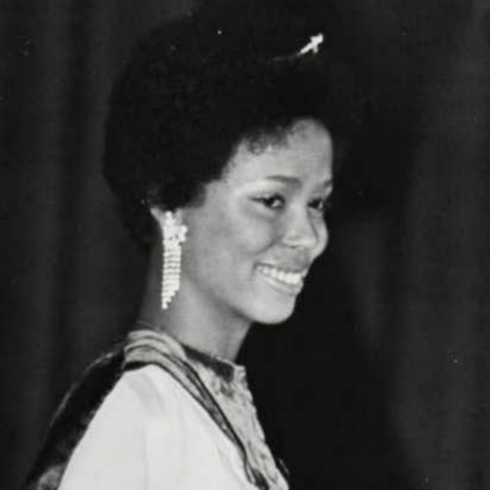
Howard University’s student body has often aligned with or adjusted to the political, cultural, and social justice priorities of the broader Black community, which, whether directly affiliated or not, looked to Howard to drive social change. "As the shifts in political awareness and social responsibility permeated the academic landscape, the very nature of The Howard Woman, and thus, Miss Howard, also experienced a transformation," said Jennifer Thomas, former Miss Howard and associated professor in the Cathy Hughes School of Communications in her Journal of Negro Education article, "Pageantry & Politics: Miss Howard University from Civil Rights to Black Power." When Stokely Carmichael (Kwame Ture) (B.A. ’64) assumed the chairmanship of the Student Nonviolent Coordinating Committee and made “Black Power” a famous term, Howard students also challenged standards of beauty which presumed that straighter hair was always preferable to the natural hair of many Black women. Those challenges culminated with the 1966 election of Robin Gregory as Homecoming Queen, the first Howard queen to wear her hair in an afro. Gregory’s election became emblematic of the feelings of many Blacks in the 1960s and was chronicled in the Emmy and Peabody-Award winning series "Eyes on the Prize."
Joyce Ladner, Ph.D., former professor of sociology, provost and interim president at Howard University
A native of Hattiesburg, Mississippi, Dr. Joyce Ladner began her crusade for social justice as a teenager when she helped organize an NAACP Youth Chapter in her hometown. She was expelled from Jackson State College (now Jackson State University) in 1961 for organizing a sit-in designed to protest racial segregation, yet her thirst for knowledge and justice continued. Later that year, Ladner enrolled at Tougaloo College and participated in most of the major civil rights protests of the sixties. She was also a member of the 12-person staff that organized the March on Washington in 1963. Ladner went on to earn a B.A. from Tougaloo College in 1964 and a Ph.D. from Washington University in St. Louis in 1968. When she became interim president of Howard University in 1994, she helped the university navigate financial and administrative challenges. Ladner is the only Black woman interim president in the university’s history, and is joined only by Artis Hampshire-Cowan, who served as acting president, as the only other Black woman to lead the institution in 158 years. Following her time as interim president, Ladner was appointed by President Bill Clinton to the District of Columbia Financial Control Board for a three-year term, to balance the city’s budget after it became bankrupt.
Torchbearers for the Future
Sydney Satchell (B.A. ’14), 2024 Paralympic gold medalist, pastor, and speaker

Growing up in Windsor, Connecticut, Satchell dreamed of becoming the first Black woman to play on the U.S. lacrosse team in the Olympics. A three-sport athlete throughout childhood, Satchell played lacrosse, basketball, and soccer before eventually choosing to focus on lacrosse, which she played for three years while majoring in sports management at Howard. After graduation, however, a car accident in January 2015 forever altered Satchell’s life. While driving to work, Satchell swerved on an icy road to avoid an oncoming pickup truck, hitting a tree in the process. Her left leg was pinned to the door and later had to be amputated.
After the accident, she had to search for a new “normal,” which landed her at the intersection of some of her favorite interests. As a student, she had been a huge fan of Howard’s volleyball team and decided to try sitting volleyball. In February 2016, she was invited to a sitting volleyball camp. By 2017, she had relocated to Edmond, Oklahoma, to start practicing with the national team. Satchell became an official member of The U.S. Women’s Sitting National Team and started participating in international competitions in 2019. In September 2024, Satchell, a first-time Paralympian, took home the gold medal in sitting volleyball during the 2024 Paralympic Games in Paris, France. Her commitment to athletics and perseverance through her recovery led the Howard Department of Athletics to establish the Sydney Satchell Award for Perseverance, one of the most prestigious honors for a Bison student-athlete. This award is given to a student athlete who has persevered through challenges during his or her collegiate career.
Jay Jones (B.A. ’25) Howard University Student Association executive president
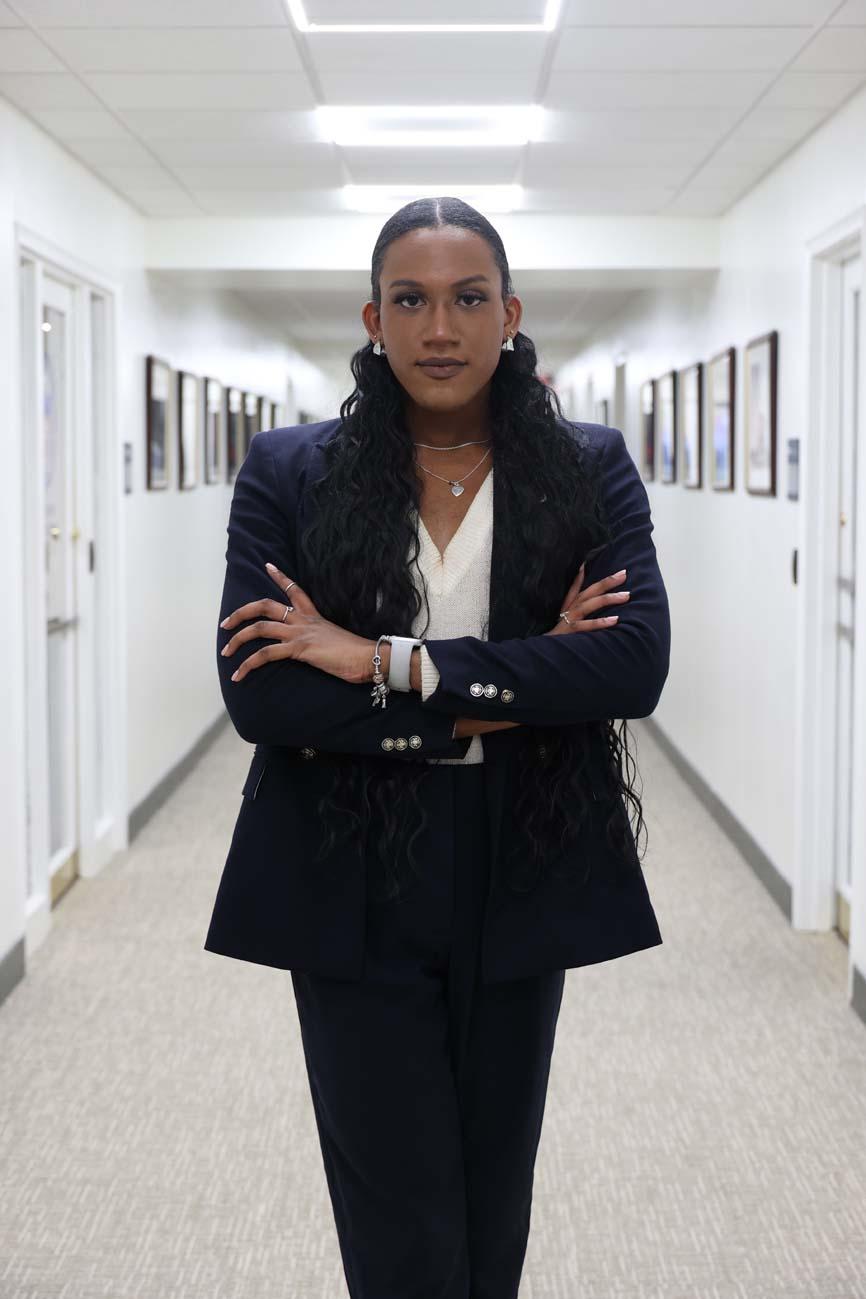
Jay Jones, a senior political science major from Greensboro, North Carolina, never envisioned becoming the 64th executive president of the Howard University Student Association (HUSA). Nevertheless, she has been an empathetic leader who never forgets about the people she represents. Jones won her first student government campaign in the eighth grade. She was inspired by the leadership of Rep. Shirley Chisolm, the expressions of author James Baldwin, and the advocacy of activist Kwame Ture (B.A., ’64). In May 2024, Jones became the first transgender person to be elected president of HUSA and the only person of trans (woman) experience to lead a student government association at an HBCU. Jones can often be caught answering multiple calls at once, solving student issues walking to and from class, or engaged in political debates — all while navigating The Yard in high heels. She describes Howard as the place that has seen her through all stages of her life: emotional transitions, identity transitions, and gender transitions. At Howard, Jones learned to stand up for what she believes in and to walk in her purpose. She has looked to her peers for inspiration, and, in turn, she inspires them by her actions. Jones has garnered national attention not just for her leadership, but by the courage with which she has presented her authentic self.
Howard Women Researchers
Cecile Hoover Edwards, Ph.D., nutritionist, professor of nutrition and research, and chair of the Department of Home Economics at Howard University
Dr. Cecile A. Hoover Edwards was born Oct. 26, 1926, in East Saint Louis, Illinois. Growing up, she attended segregated schools and graduated with honors at the age of 15. In 1971, Edwards was appointed professor of nutrition and chair of the department at Howard. She structured the new school of Human Ecology at Howard and served as dean of the school from 1974 to 1990. She also served as dean of the School of Continuing Education from 1986 to 1987 and as interim dean of the College of Pharmacy, Nursing, and Allied Health Sciences from 1997 to 1998. She retired in 1999 as professor emeritus of nutrition. Throughout her years at Tuskegee Institute, North Carolina A&T State University, and Howard, Edwards focused her research on the goal of improving the health of economically deprived people. Her research on amino acids was directed to educating people about the basics of fortifying the body with proper nutrition. In the course of her career, Edwards published over 160 articles in peer reviewed journals.
Kirsten Branch (B.S. ’25), student researcher, social justice champion
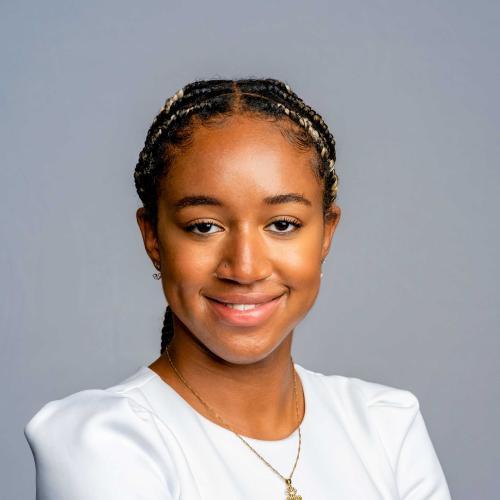
Kirsten Branch is a graduating senior biology major with minors in chemistry and psychology who has conducted acute myeloid leukemia research for the past two summers. Post-graduation, Branch intends to continue her research this summer at the University of Pennsylvania before pursuing a dual MD/Ph.D., with the goals of becoming a medical doctor and health care policy advocate. Despite uncertainties around future research funding, she remains optimistic about the future of her field, bolstered by much of what she has learned as a Howard student.




